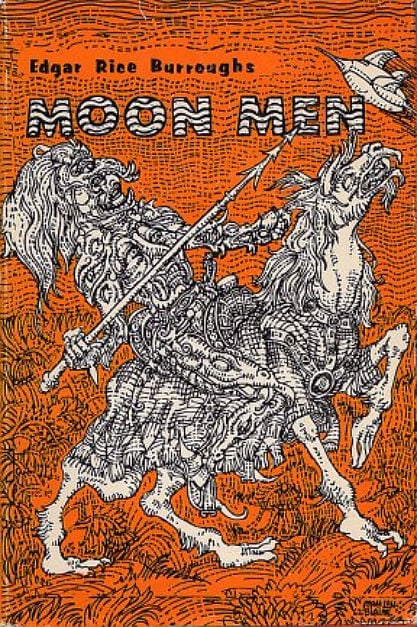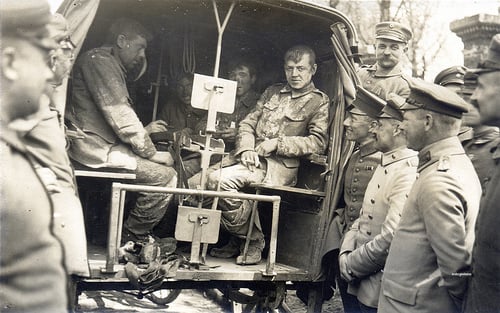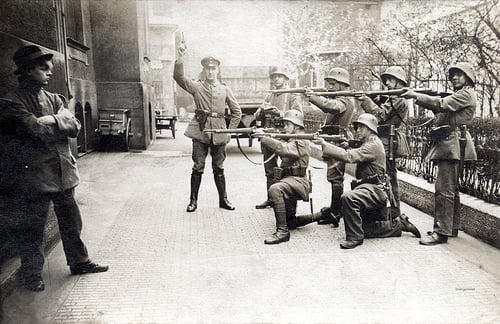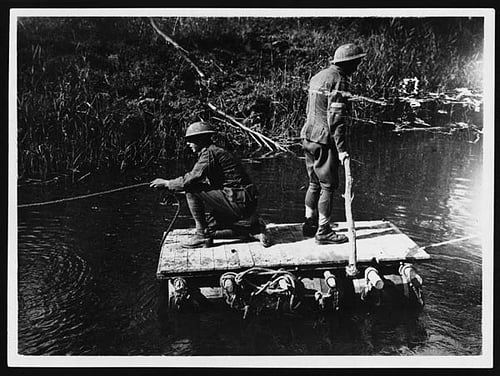The Moon Men (6)
By:
August 1, 2013

HILOBROW is pleased to present the sixth installment of our serialization of “The Moon Men,” a science fiction story by Edgar Rice Burroughs — best known for his Tarzan and John Carter stories — that was first serialized in Argosy All-Story Weekly in 1925. It is the second section of The Moon Maid saga, which gallops from Julian 5th’s crash-landing on the moon, where he encounters subhuman Kalkars who dwell in the asteroid’s hollow interior; to the same Julian’s doomed effort to defeat a Kalkar invasion of Earth; to the final triumph of Red Hawk (Julian 20th), the leader of a tribe of near-savage freedom-fighters. The “Moon Men” section follows Julian 9th’s rebellion against the descendants of the Moon Men. New installments will appear each Thursday for 11 weeks.
ALL EXCERPTS: 1 | 2 | 3 | 4 | 5 | 6 | 7 | 8 | 9 | 10 | 11
SUBSCRIBE to HILOBROW’s serialized fiction via RSS.
CHAPTER SIX: THE COURT MARTIAL
That afternoon I saw a small detachment of the Kash Guard crossing the market place. They came directly toward my pen and stopped before it. The sergeant in charge addressed me: “You are Brother Julian 9th?” he asked.
“I am Julian 9th,” I replied.
“You had better be Brother Julian 9th when you are addressed by Brother General Or-tis,” he snapped back. “You are under arrest — come with me!”
“What for?” I asked.
“Brother Or-tis will tell you if you do not know — you are to be taken to him.”
So! It had come and it had come quickly. I felt sorry for mother; but, in a way, I was glad. If only there had been no such person in the world as Juana St. John I should have been almost happy, for I knew mother and father would come soon and, as she always taught me, we would be reunited in a happy world on the other side — a world in which there were no Kalkars or taxes — but then there was a Juana St. John and I was very sure of this world, while not quite so sure of the other, which I had never seen, nor any one who had.
There seemed no particular reason for refusing to accompany the Kash Guard. They would simply have killed me with their bullets and if I went I might have an opportunity to wipe out some more important swine than they before I was killed — if they intended killing me. One never knows what they will do — other than that it will be the wrong thing.
Well, they took me to the headquarters of the teivos, way down on the shore of the lake; but as they took me in a large wagon drawn by horses it was not a tiresome trip and, as I was not worrying, I enjoyed it. We passed through many market places, for numerous districts lie between ours and headquarters, and always the people stared at me, just as I had stared at other prisoners being carted away to no one knew what fate. Sometimes they came back — sometimes they did not. I wondered which I would do.

At last we arrived at headquarters after passing through miles of lofty ruins where I had played and explored as a child. I was taken immediately into Or-tis’s presence. He sat in a large room at the head of a long table, and I saw that there were other men sitting along the sides of the table, the local representatives of that hated authority known as the Twenty-Four, the form of government that the Kalkars had brought with them from the moon a century before. The Twenty-Four originally consisted of a committee of that number. Now, however, it was but a name that stood for power, for government and for tyranny. Jarth the Jemadar was, in reality, what his lunar title indicated — emperor. Surrounding him was a committee of Twenty-Four Kalkars; but as they had been appointed by him and could be removed by him at will, they were nothing more than his tools. And this body before which I had been haled had in our teivos the same power as the Twenty-Four which gave it birth, and so we spoke of it, too, as the Twenty-Four, or as the Teivos, as I at first thought it to be.
Many of these men I recognized as members of the Teivos. Pthav and Hoffmeyer were there, representing our district, or misrepresenting it, as father always put it, yet I was presently sure that this could not be a meeting of the Teivos proper, as these were held in another building father south — a magnificent pillared pile of olden times that the government had partially restored as they had the headquarters, which also had been a beautiful building in a past age, its great lions still standing on either side of its broad entranceway.

No, it was not the Teivos; but what could it be, and then it dawned upon me that it must be an arm of the new law that Or-tis had announced, and such it proved to be — a special military tribunal for special offenders. This was the first session and it chanced to be my luck that I committed my indiscretion just in time to be hauled before it when it needed someone to experiment on.
I was made to stand, under guard, at the foot of the table and as I looked up and down the rows of faces on either side I saw not a friendly eye — no person of my class or race — just swine, swine, swine. Low-browed, brute-faced men, slouching in their chairs, slovenly in their dress, uncouth, unwashed, unwholesome looking — this was the personnel of the court that was to try me — for what?
Or-tis asked who appeared against me and what was the charge. Then I saw Soor for the first time. He should have been in his district collecting his taxes; but he wasn’t. No, he was there on more pleasant business. He eyed me malevolently and stated the charge: resisting an officer of the law in the discharge of his duty and assaulting same with a deadly weapon with intent to commit murder.
They all looked ferociously at me, expecting, no doubt, that I would tremble with terror, as most of my class did before them; but I couldn’t tremble — the charge struck me as so ridiculous. As a matter of fact, I am afraid that I grinned. I know I did.
“What is it,” asked Or-tis, “that amuses you so?”
“The charge,” I replied.
“What is there funny about that?” he asked again. “Men have been shot for less — men who were not suspected of treasonable acts.”
“I did not resist an officer in the discharge of his duty,” I said. “It is not one of a tax collector’s duties to put a family out of its pen at the market place, is it? — a pen they have occupied for three generations. I ask you, Or-tis, is it?”
Or-tis half rose from his chair. “How dare you address me thus?” he cried.
The others turned scowling faces upon me and, beating the table with their dirty fists, they all shouted and bellowed at me at once; but I kept my chin up as I had sworn to do until I died.
Finally they quieted down and again I put my question to Or-tis and I’ll give him credit for answering it fairly. “No,” he said, “only the Teivos may do that — the Teivos or the commandant.”
“Then I did not resist an officer in the discharge of his duty,” I shot back at them, “for I only refused to leave the pen that is mine. And now another question: Is a cheese a deadly weapon?”
They had to admit that it was not. “He demanded a present from my father,” I explained, “and I brought him a cheese. He had no right under the law to demand it, and so I threw it at him and it hit him in the face. I shall deliver thus every such illegal tithe that is demanded of us. I have my rights under the law and I intend to see that they are respected.”
They had never been talked to thus before and suddenly I realized that by merest chance I had stumbled upon the only way in which to meet these creatures. They were moral as well as physical cowards. They could not face an honest, fearless man — already they were showing signs of embarrassment. They knew that I was right and while they could have condemned me had I bowed the knee to them they hadn’t the courage to do it in my presence.
The natural outcome was that they sought a scapegoat, and Or-tis was not long in finding one — his baleful eye alighted upon Soor.
“Does this man speak the truth?” he cried at the tax collector. “Did you turn him out of his pen? Did he do no more than throw a cheese at you?”
Soor, a coward before those in authority over him, flushed and stammered.
“He tried to kill me,” he mumbled lamely, “and he did almost kill Brother Vonbulen.”
Then I told them of that — and always I spoke in a tone of authority and I held my ground. I did not fear them and they knew it. Sometimes I think they attributed it to some knowledge I had of something that might be menacing them — for they were always afraid of revolution. That is why they ground us down so.
The outcome of it was that I was let go with a warning — a warning that if I did not address my fellows as brother I would be punished, and even then I gave the parting shot, for I told them I would call no man brother unless he was.
The whole affair was a farce; but all trials were farces, only, as a rule, the joke was on the accused. They were not conducted in a dignified or proper manner as I imagine trials in ancient times to have been. There was neither order nor system.
I had to walk all the way home — another manifestation of justice — and I arrived there an hour or two after supper time. I found Jim and Mollie and Juana at the house, and I could see that mother had been crying. She started again when she saw me. Poor mother! I wonder if it has always been such a terrible thing to be a mother; but, no, it cannot have been, else the human race would long since have been extinct — as the Kalkars will rapidly make it, anyway.
Jim had told them of the happenings in the market place — the episode of the bull, the encounter with Vonbulen and the matter of Soor. For the first time in my life, and the only time, I heard my father laugh aloud. Juana laughed, too; but there was still an undercurrent of terror that I could feel and which Mollie finally voiced.
“They will get us yet, Julian,” she said; “but what you have done is worth dying for.”
“Yes!” cried my father. “I can go to the butcher with a smile on my lips after this. He has done what I always wanted to do; but dared not. If I am a coward I can at least thank God that there sprang from my loins a brave and fearless man.”
“You are not a coward!” I cried, and mother looked at me and smiled. I was glad that I said that, then.
You may not understand what father meant by “going to the butcher,” but it is simple. The manufacture of ammunition is a lost art — that is, the high-powered ammunition that the Kash Guard likes to use — and so they conserve all the vast stores of ammunition that were handed down from ancient times — millions upon millions of rounds — or they would not be able to use the rifles that were handed down with the ammunition. They use this ammunition only in cases of dire necessity, a fact which long ago placed the firing squad of old in the same class with flying machines and automobiles. Now they cut our throats when they kill us and the man who does it is known as the butcher.

I walked home with Jim and Mollie and Juana; but more especially Juana. Again I noticed that strange magnetic force which drew me to her, so that I kept bumping into her every step or two, and, intentionally, I swung my arm that was nearest to her in the hope that my hand might touch hers, nor was I doomed to disappointment and at every touch I thrilled. I could not but notice that Juana made no mention of my clumsiness, nor did she appear to attempt to prevent our contact; but yet I was afraid of her — afraid that she would notice and afraid that she would not. I am good with horses and goats and Hellhounds; but I am not much good with girls.
We had talked upon many subjects and I knew her views and beliefs and she knew mine, so when we parted and I asked her if she would go with me on the morrow, which was the first Sunday of the month, she knew what I meant. She said that she would, and I went home very happy, for I knew that she and I were going to defy the common enemy side by side — that hand in hand we would face the Grim Reaper for the sake of the greatest cause on earth.
On the way home I overtook Peter Johansen going in the direction of our home. I could see that he had no mind to meet me and he immediately fell to explaining lengthily why he was out at night, for the first thing I did was to ask him what strange business took him abroad so often lately after the sun had set.
I could see him flush even in the dark.
“Why,” he exclaimed, “this is the first time in months that I have gone out after supper,” and then something about the man made me lose my temper and I blurted out what was in my heart.
“You lie!” I cried. “You lie, you damned spy!”
And then Peter Johansen went white and, suddenly whipping a knife from his clothes, he leaped at me, striking wildly for any part of me that the blade might reach. At first he almost got me, so unexpected and so venomous was the attack; but though I was struck twice on the arm and cut a little I managed to ward the point from any vital part, and in a moment I had seized his knife wrist. That was the end — I just twisted it a little — I did not mean to twist hard — and something snapped inside his wrist.
Peter let out an awful scream, his knife dropped from his fingers, and I pushed him from me and gave him a good kick as he was leaving — a kick that I think he will remember for some time. Then I picked up his knife and hurled it as far as I could in the direction of the river, where I think it landed, and went on my way toward home — whistling.
When I entered the house mother came out of her room and, putting her arms about my neck, she clung closely to me.
“Dear boy,” she murmured, “I am so happy, because you are happy. She is a dear girl, and I love her as much as you do.”
“What is the matter?” I asked. “What are you talking about?”
“I heard you whistling,” she said, “and I knew what it meant — grown men whistle but once in their lives.”
I picked her up in my arms.
“Oh, mother, dear!” I cried. “I wish it were true and maybe it will be some day — if I am not too much of a coward; but not yet.”
“Then why were you whistling?” she asked, surprised and a bit skeptical, too, I imagine.
“I whistled,” I explained, “because I just broke the wrist of a spy and kicked him across the road.”
“Peter?” she asked, trembling.
“Yes, mother, Peter. I called him a spy and he tried to knife me.”
“Oh, my son!” she cried. “You did not know. It is my fault, I should have told you. Now he will fight no more in the dark; but will come out in the open and when he does that I am lost.”
“What do you mean?” I asked.
“I do not mind dying,” she said; “but they will take your father first, because of me.”
“What do you mean? I can understand nothing of what you are driving at.”
“Then listen,” she said. “Peter wants me. That is the reason he is spying on your father. If he can prove something against him and father is taken to the mines or killed, Peter will claim me.”
“How do you know this?” I asked.
“Peter himself has told me that he wants me. He tried to make me leave your dear father and go with him, and when I refused he bragged that he was in the favor of the Kalkars and that he would get me in the end. He has tried to buy my honor with your father’s life. That is why I have been so afraid and so unhappy; but I knew that you and father would rather die than have me do that thing, and so I have withstood him.”
“Did you tell father?” I asked.
“I dared not. He would have killed Peter and that would have been the end of us, for Peter stands high in the graces of the authorities.”
“I will kill him!” I said.
She tried to dissuade me, and finally I had to promise her that I would wait until I had provocation that the authorities might recognize. God knows I had provocation enough, though.
After breakfast the next day we set out singly and in different directions, as was always our custom on the first Sunday in each month. I went to Jim’s first to get Juana as she did not know the way, having never been with us. I found her ready and waiting and alone, as Jim and Mollie had started a few minutes before, and seemingly very glad to see me.
I told her nothing of Peter, as there is enough trouble in the world without burdening people with any that does not directly threaten them. I led her up the river for a mile and all the while we watched to see if we were followed. Then we found a skiff, where I had hidden it, and crossed the river. After hiding it again we continued on up for half a mile. Here was a raft that I had made myself, and on this we poled again to the other shore — if any followed us they must have swum, for there were no other boats on this part of the river.

I had come this way for several years — in fact, ever since I was fifteen years old — and no one had ever suspected or followed me, yet I never relaxed my vigilance, which may account for the fact that I was not apprehended. No one ever saw me take to either the skiff or the raft and no one could even have guessed my destination, so circuitous was the way.
A mile west of the river is a thick forest of very old trees and toward this I led Juana. At its verge we sat down, ostensibly to rest; but really to see if any one was near who might have followed us or who could accidentally discover our next move. There was no one in sight, and so, with light hearts, we arose and entered the forest.
For a quarter of a mile we made our way along a winding path and then I turned to the left at a right angle and entered thick brush where there was no trail. Always we did this, never covering the last quarter of a mile over the same route, lest we make a path that might be marked and followed.
Presently we came to a pile of brush wood, beneath one edge of which was an opening into which, by stooping low, one might enter. It was screened from view by a fallen tree, over which had been heaped broken branches. Even in winter time and early spring the opening in the brush beyond was invisible to the passers-by, if there had been any passers-by. A man trailing lost stock might come this way; but no others, for it was a lonely and unfrequented spot. During the summer, the season of the year when there was the greatest danger of discovery, the entire brush pile and its tangled screen were hidden completely beneath a mass of wild vines, so that it was with difficulty that we found it ourselves.
Into this opening I led Juana — taking her by the hand as one might a blind person, although it was not so dark within that she could not see perfectly every step she took. However, I took her by the hand, a poor excuse being better than none. The winding tunnel beneath the brush was a hundred yards long, perhaps — I wished then that it had been a hundred miles. It ended abruptly before a rough stone wall in which was a heavy door. Its oaken panels were black with age and streaked with green from the massive hinges that ran across its entire width in three places, while from the great lag screws that fastened them to the door brownish streaks of rust ran down to mingle with the green and the black. In patches moss grew upon it, so that all in all it had the appearance of great antiquity, though even the oldest among those who knew of it at all could only guess at its age. Above the door, carved in the stone, was a shepherd’s crook and the words, Dieu et mon droit.

Halting before this massive portal I struck the panels once with my knuckles, counted five and struck again, once; then I counted three and, in the same cadence, struck three times. It was the signal for the day — never twice was it the same. Should one come with the wrong signal and later force the door he would find only an empty room beyond.
Now the door opened a crack and an eye peered forth, then it swung outward and we entered a long, low room lighted by burning wicks floating in oil. Across the width of the room were rough wooden benches and at the far end a raised platform upon which stood Orrin Colby, the blacksmith, behind an altar which was the sawn-off trunk of a tree, the roots of which, legend has it, still run down into the ground beneath the church, which is supposed to have been built around it.
RADIUM AGE SCIENCE FICTION: “Radium Age” is HILOBROW’s name for the 1904–33 era, which saw the discovery of radioactivity, the revelation that matter itself is constantly in movement — a fitting metaphor for the first decades of the 20th century, during which old scientific, religious, political, and social certainties were shattered. This era also saw the publication of genre-shattering writing by Edgar Rice Burroughs, Sax Rohmer, E.E. “Doc” Smith, Jack London, Arthur Conan Doyle, Aldous Huxley, Olaf Stapledon, Karel Čapek, H.P. Lovecraft, Charlotte Perkins Gilman, Yevgeny Zamyatin, Philip Gordon Wylie, and other pioneers of post-Verne/Wells, pre-Golden Age “science fiction.” More info here.
READ GORGEOUS PAPERBACKS: HiLoBooks has reissued the following 10 obscure but amazing Radium Age science fiction novels in beautiful print editions: Jack London’s The Scarlet Plague, Rudyard Kipling’s With the Night Mail (and “As Easy as A.B.C.”), Arthur Conan Doyle’s The Poison Belt, H. Rider Haggard’s When the World Shook, Edward Shanks’ The People of the Ruins, William Hope Hodgson’s The Night Land, J.D. Beresford’s Goslings, E.V. Odle’s The Clockwork Man, Cicely Hamilton’s Theodore Savage, and Muriel Jaeger’s The Man with Six Senses. For more information, visit the HiLoBooks homepage.
SERIALIZED BY HILOBOOKS: Jack London’s The Scarlet Plague | Rudyard Kipling’s With the Night Mail (and “As Easy as A.B.C.”) | Arthur Conan Doyle’s The Poison Belt | H. Rider Haggard’s When the World Shook | Edward Shanks’ The People of the Ruins | William Hope Hodgson’s The Night Land | J.D. Beresford’s Goslings | E.V. Odle’s The Clockwork Man | Cicely Hamilton’s Theodore Savage | Muriel Jaeger’s The Man With Six Senses | Jack London’s “The Red One” | Philip Francis Nowlan’s Armageddon 2419 A.D. | Homer Eon Flint’s The Devolutionist | W.E.B. DuBois’s “The Comet” | Edgar Rice Burroughs’s The Moon Men | Charlotte Perkins Gilman’s Herland | Sax Rohmer’s “The Zayat Kiss” | Eimar O’Duffy’s King Goshawk and the Birds | Frances Hodgson Burnett’s The Lost Prince | Morley Roberts’s The Fugitives | Helen MacInnes’s The Unconquerable | Geoffrey Household’s Watcher in the Shadows | William Haggard’s The High Wire | Hammond Innes’s Air Bridge | James Branch Cabell’s Jurgen | John Buchan’s “No Man’s Land” | John Russell’s “The Fourth Man” | E.M. Forster’s “The Machine Stops” | John Buchan’s Huntingtower | Arthur Conan Doyle’s When the World Screamed | Victor Bridges’ A Rogue By Compulsion | Jack London’s The Iron Heel | H. De Vere Stacpoole’s The Man Who Lost Himself | P.G. Wodehouse’s Leave It to Psmith | Richard Connell’s “The Most Dangerous Game” | Houdini and Lovecraft’s “Imprisoned with the Pharaohs” | Arthur Conan Doyle’s “The Sussex Vampire”.
ORIGINAL FICTION: HILOBROW has serialized three novels: James Parker’s The Ballad of Cocky The Fox (“a proof-of-concept that serialization can work on the Internet” — The Atlantic); Karinne Keithley Syers’s Linda Linda Linda (which includes original music); and Robert Waldron’s roman à clef The School on the Fens. We also publish original stories and comics. These include: Matthew Battles’s stories “Gita Nova“, “Makes the Man,” “Imago,” “Camera Lucida,” “A Simple Message”, “Children of the Volcano”, “The Gnomon”, “Billable Memories”, “For Provisional Description of Superficial Features”, “The Dogs in the Trees”, “The Sovereignties of Invention”, and “Survivor: The Island of Dr. Moreau”; several of these later appeared in the collection The Sovereignties of Invention | Peggy Nelson’s “Mood Indigo“, “Top Kill Fail“, and “Mercerism” | Annalee Newitz’s “The Great Oxygen Race” | Flourish Klink’s Star Trek fanfic “Conference Comms” | Charlie Mitchell’s “A Fantasy Land” | Charlie Mitchell’s “Sentinels” | Joshua Glenn’s “The Lawless One”, and the mashup story “Zarathustra vs. Swamp Thing” | Adam McGovern and Paolo Leandri’s Idoru Jones comics | John Holbo’s “Sugarplum Squeampunk” | “Another Corporate Death” (1) and “Another Corporate Death” (2) by Mike Fleisch | Kathryn Kuitenbrouwer and Frank Fiorentino’s graphic novel “The Song of Otto” (excerpt) | John Holbo’s graphic novel On Beyond Zarathustra (excerpt) | “Manoj” and “Josh” by Vijay Balakrishnan | “Verge” by Chris Rossi, and his audio novel Low Priority Hero | EPIC WINS: THE ILIAD (1.408-415) by Flourish Klink | EPIC WINS: THE KALEVALA (3.1-278) by James Parker | EPIC WINS: THE ARGONAUTICA (2.815-834) by Joshua Glenn | EPIC WINS: THE MYTH OF THE ELK by Matthew Battles | TROUBLED SUPERHUMAN CONTEST: Charles Pappas, “The Law” | CATASTROPHE CONTEST: Timothy Raymond, “Hem and the Flood” | TELEPATHY CONTEST: Rachel Ellis Adams, “Fatima, Can You Hear Me?” | OIL SPILL CONTEST: A.E. Smith, “Sound Thinking | LITTLE NEMO CAPTION CONTEST: Joe Lyons, “Necronomicon” | SPOOKY-KOOKY CONTEST: Tucker Cummings, “Well Marbled” | INVENT-A-HERO CONTEST: TG Gibbon, “The Firefly” | FANFICTION CONTEST: Lyette Mercier’s “Sex and the Single Superhero”
